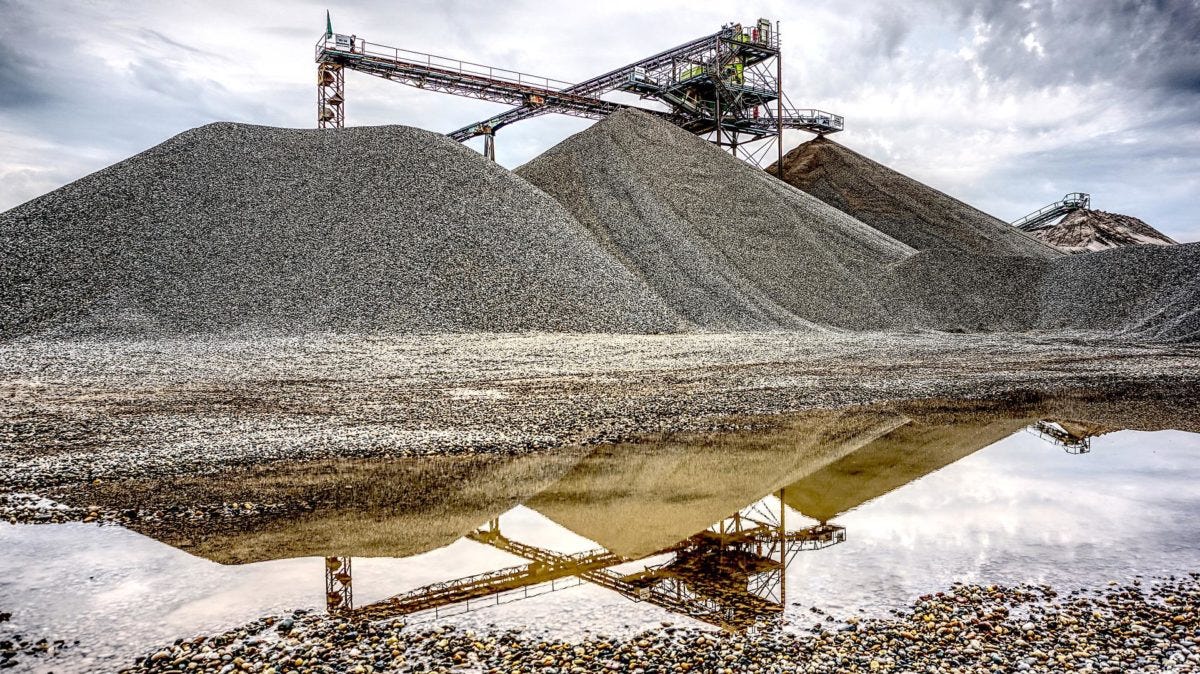Photo: A gravel mine. Credit: distelAAPArath / pixabay
Today I’m in conversation by Mike Balkwill, Vice President of Campaigns and Engagement for Small Change Fund and Campaign Director for Reform Gravel Mining Coalition
For those unfamiliar with gravel mining in Ontario, about 165 million metric tonnes of aggregate is produced each year.
However, the Ford government has authorized annual extraction limits of over 13 times that amount and continues issuing new licences that consume approximately 2,023 hectares (5,000 acres) of land annually.
Ontario provincial policy around land use management states, “There’s no need to show need for a new pit or quarry. As much gravel shall be made available as possible and no discussion of whether it’s needed or not shall be allowed.”
The industry is also licenced to take up to 4.6 billion litres of water daily for extraction processes.
In December 2023, the Ontario Auditor General report stated the industry is not managed adequately and that Ontarians can expect violations that will likely to be unpublished by the Ford government.
That means that while we are in the middle of a climate crisis and water, in some communities, is under threat from drought and corporate extraction for gravel mining as well as bottling, the Ford government is not enforcing aggregate regulations that reflect sound ecological practices.
Gravel mining increases truck traffic on local roads, affects air quality, generates noise, poses threats to groundwater and generates vibrations that damage homes. Yet, single-family homeowners often pay more in property taxes than a 40.5 hectares (100 acre) commercial gravel mine.
Balkwill and I discuss, in depth, the Hallman pit in Wilmot Township which is part of Waterloo Region.
4 years ago, Wilmot City Council unanimously voted to deny Jackson Harvest Farms Incorporated a rezoning application that would have allowed 57 hectares (150 acres) of prime farmland to be used for aggregate extraction, asphalt recycling, concrete recycling and five waste ponds.
The site threatens a regional ground water recharge area, municipal well-head protected area, protected countryside as well as a significant wetland.
No fewer than seven open pit mines are located directly across from the proposed Jackson Harvest Farms pit. The seven pits currently extract only ten per cent of their total licenced capacity making the Jackson Harvest Farms pit redundant.
Rather than accepting the council’s decision, the owners of Jackson Harvest Farms appealed council’s decision to the Ontario Land Tribunal (OLT).
Wilmot council made the political choice to not defend its decision at the OLT. Instead, Citizens for Safe Groundwater, a non-profit organization protecting the Waterloo Moraine’s groundwater from industrial aggregate activity, opposed the licence at the seven-day OLT hearing.
Citizens for Safe Groundwater argued against licencing the pit based on the impacts to air quality and health, noise, transportation, as well as a lack of consistency with Provincial Policy Statement and the Growth Plan for the Greater Golden Horseshoe.
On February 21, 2024, the adjudicator ruled in favour of Jackson Harvest Farms. There is no appeal process for an OLT decision.
However, Citizens for Safe Groundwater has since filed for a judicial review of the OLT decision. That means they have formally requested a Motion for a Leave to Appeal the OLTs decision to the divisional court. Citizens for Safe Groundwater believes that the OLT ruling contains several legal errors that are detrimental to the public interest.
Balkwill sees this OLT ruling as a failure of the Ford government, local and municipal governments and the OLT process to protect Ontarians, farmland and ecologically significant areas from unnecessary development.
It’s important to note, that once quarries and pits have been exhausted, they are supposed to be rehabilitated. However, for the most part, these multi-national corporations are foreign owned and conduct business without regulation enforcement.
The aggregate industry knew Ford would give them whatever they wanted including rolling back endangered species protection and removing municipal consultations.
None of that bodes well when talking about rehabilitation, because destroyed farmland can never be restored and rehabilitation can take hundreds of years which means it’s a multi-generational commitment and who’s going to be around to make sure it’s carried out?
The costs associated with rehabilitation are vague at best and it’s often the community, not quarry owners and operators, who actually fund rehabilitation efforts.
That means, Ontarians are expected to sacrifice prime farmland that feeds their local communities, as well as natural resources that are really part of the social commons and then they get to foot the bill for the cleanup and restoration.
Reform Gravel Mining Coalition launched the DAMN Campaign – Demand A Moratorium Now! – in 2022. Members and supporters believe that it’s important for the Ford government to place a moratorium on the issuing of new gravel mining licences, like the one that will be issued in Wilmot.
During the moratorium, the province and industry can take stock of current and licenced production levels; assess the cumulative effects of unlimited gravel mining; and assess impacts on sensitive ecological areas and prime farmland. Because, after all, gravel mining really is an industry purposely designed to be inequitable by placing all risks squarely on the shoulders of the public commons.
I encourage you to sign the DAMN petition and ask your municipality to join the DAMN Campaign. Then, check out Small Change Fund, Canada’s only crowd funding site that issues charitable tax receipts.
Thanks to everyone who read today’s article and listened to my podcast. With your continued support, a little Nicoll can make a lot of change.
Music: Real Estate by UNIVERSFIELD is licensed under a Attribution 4.0 International License. freemusicarchive.org.
*Be sure to download the Substack app to get the most from your podcast experience.













Share this post